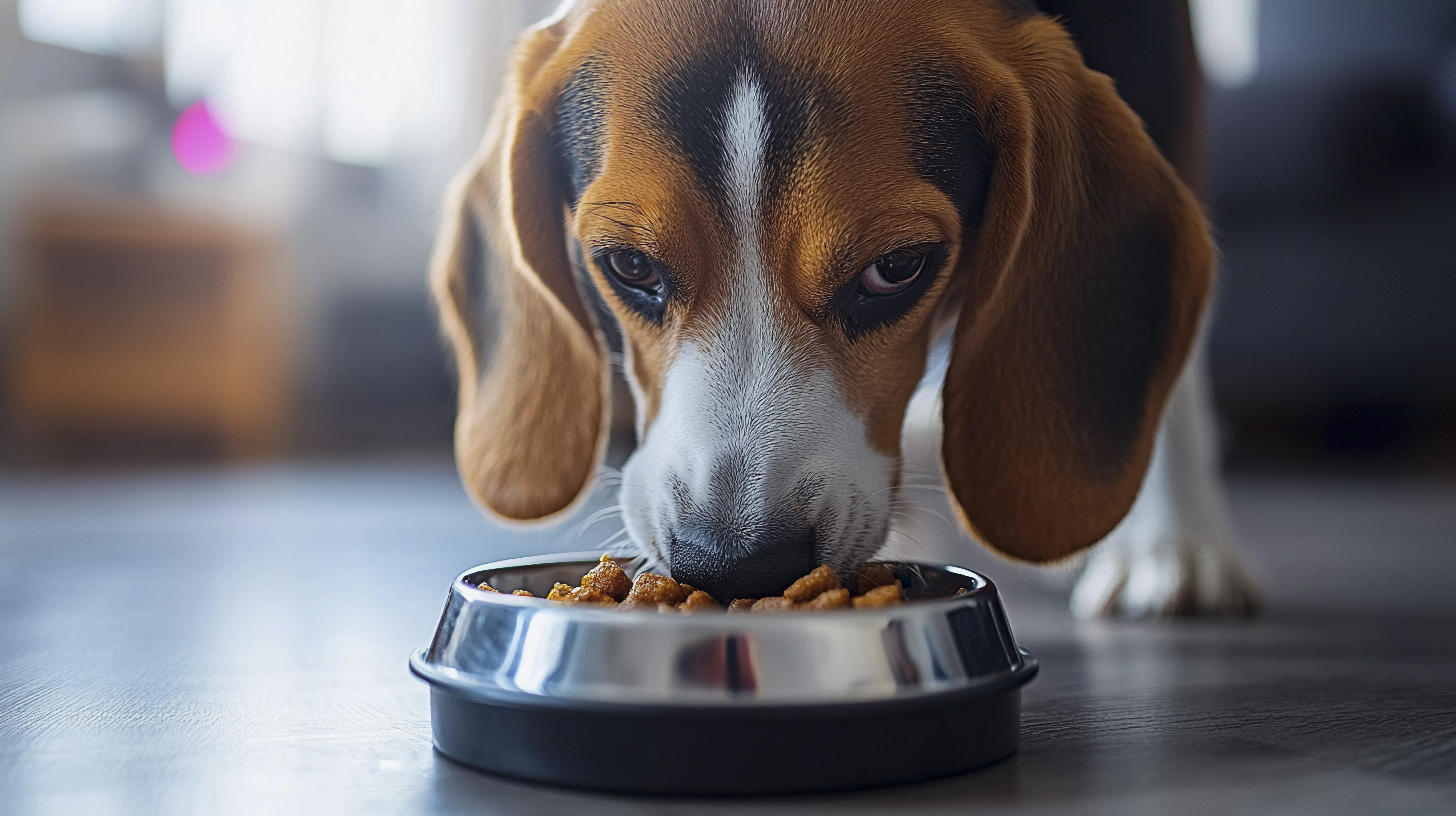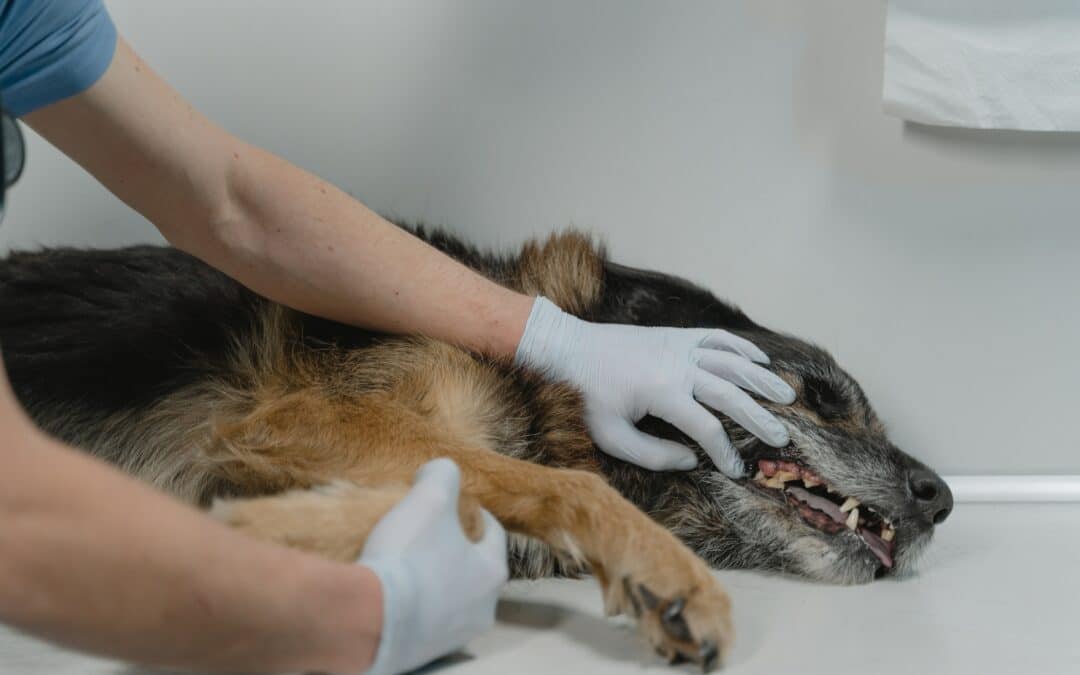A dog’s sensitive stomach can cause a pet owner great distress. Gastrointestinal symptoms can result from various health conditions, and seeing our furry friends in discomfort can be frustrating.
Some homemade foods can help dogs with sensitive stomachs. Dogs prone to stomachaches can be fed fish (such as cod or herring), white potato or sweet potato, pumpkin, broths, lean chicken, grain-free dog foods, and single-protein dog foods.
Consult with your veterinarian before changing your dog’s diet.
We all want our pups to feel their best. Below are some changes you can make, which we discuss in detail:
- Choose quality wet or dry food to manage symptoms while avoiding common allergens.
- If your pet is experiencing disease or allergy symptoms due to a poor diet, the best thing to do is schedule an appointment with your vet. They can recommend allergy shots or other treatments.
- Schedule an appointment with Paoli Vetcare for personalized care and the best food recommendations.
- Take advantage of our new client exam and start your pet on the path to better health.
To help with the above, here are some of the best options for dogs with a sensitive stomach.

What Causes Dogs to Have Sensitive Stomachs
Table of Contents
- 1 What Causes Dogs to Have Sensitive Stomachs
- 2 How to Know if Your Dog Has a Sensitive Stomach
- 3 Key Ingredients to Look for in Sensitive Stomach Dog Food
- 4 Finding the Right Food With an Elimination Diet
- 5 How to Find a High-Quality Sensitive Digestion Dog Food
- 6 Best Food Options for Dogs with Sensitive Stomachs
- 7 Tips to Boost Your Dog’s Immune System
- 8 How To Transition Your Dog to a Different Food
- 9 Consult your Veterinarian
- 10 Conclusion
Signs that your dog has a sensitive subject include vomiting, diarrhea, bloating, and loss of appetite. Symptoms can also manifest in other ways, including skin problems, itching, and weight loss. Pinning the problem can be challenging, but noting these common problems can help narrow down the issue for your veterinarian.
Change in diet
Dogs can often experience sensitive stomachs when their diets change. Switching to a new food, even per the recommendation of your veterinarian, can lead to symptoms including vomiting, diarrhea, and bloating.
Abrupt changes or the introduction of new foods can disrupt the gut’s bacteria, causing an upset stomach. It’s important to gradually transition your dog’s diet for days to minimize any upsets and problems.
Allergies
Allergies can be the root of many tummy troubles, manifesting outwardly as skin problems, itching, or digestive issues. Dogs can develop sensitivities to ingredients just like people, and sometimes you might not know a particular ingredient has been introduced into their diet. It’s important to always check the ingredient label on foods you buy to ensure that the food company has not added fillers like grains, proteins, or other additives.
Illness
Stomach issues and digestive issues can point to other underlying illnesses. When your dog is showing these symptoms, it’s important to let your veterinarian know if any of them persist, and to take note yourself if these symptoms stick around or return.
- Gastrointestinal Disorders: Inflammatory bowel disease, gastroenteritis, and colitis can cause symptoms such as sensitive stomach, vomiting, diarrhea, and loss of appetite. This might look like sensitive stomach issues, but the sensitive stomach is only a symptom of the illness.
- Pancreatitis: Inflammation of the pancreas can lead to diarrhea, vomiting, abdominal pain, and a hunched back. Dogs with sensitive stomachs are more prone to pancreatitis, especially if their diets suddenly change or they eat something they shouldn’t have.
- Parasitic Infections: Intestinal parasites, such as worms, can cause an upset stomach. Dogs need regular deworming and fecal examinations to rule out parasites, requiring the aid of a veterinarian.
- Allergies and Food Intolerances: Allergies can contribute to chronic skin issues and pain, and may appear as ear infections or other physical ailments. If a food intolerance is present, it needs to be addressed and ruled out as quickly as possible.
- Liver or Kidney Disease: Chronic illnesses can lead to digestive issues, especially if your dog has a sensitive stomach. These are serious conditions that should be immediately addressed by a veterinarian.
Anxiety
Dogs experience anxiety just like us, and environmental stressors can lead to stomach issues. Stress and anxiety can affect their bodies, causing decreased appetite, vomiting, or diarrhea.
Anxious dogs need special care, especially when it comes to their diets. It’s important to note your dog’s behaviors along with their eating habits when discussing them with your veterinarian.
How to Know if Your Dog Has a Sensitive Stomach
Changes in your dog’s behavior can indicate a medical problem. Dogs with sensitive stomachs can show these symptoms:
- Vomiting, often undigested food
- Diarrhea, constipation, or gas
- Blood in stools
- Lethargy and loss of appetite
- Pain or discomfort in the abdomen
You can withhold food for 24 hours to see if the symptoms improve. If your dog’s symptoms continue or worsen, schedule an appointment with your vet.
If you’re wondering what to give dogs for vomiting, you can try feeding a bland diet for a few days, for instance, by offering boiled chicken and rice.
Key Ingredients to Look for in Sensitive Stomach Dog Food
To make life easier for your dog, look for these key ingredients that can calm their stomach and make digestion easier.
- Easily Digestible Proteins: Chicken, turkey, and fish are easy for your dog to digest, gentle on the stomach, and high in protein.
- Prebiotics and Probiotics: Humans can get their probiotics through ingredients like yogurt, cheese, and kimchi, but you need to ensure your dog is maintaining a beneficial balance of gut bacteria, aiding their digestion.
- Dietary Fibers: Sweet potatoes, pumpkin, and other fiber-rich dog-safe vegetables can greatly aid in digestive health by regulating bowel movements.
What are prebiotics and probiotics? Prebiotics are non-digestible plant fibers that feed on the gut’s good bacteria, typically found in apples, oats, and whole grains. Probiotics are live microorganisms found in fermented foods like yogurt, cheese, and bread. which feed on the prebiotics to create better gut health. Prescription dog foods often have prebiotics and probiotics added to stimulate your dog’s digestive system and improve overall gut health.
Ingredients to Avoid
Dogs with sensitive stomachs can have a tough time with certain ingredients that might exacerbate their condition. Identify and avoid these ingredients in your dog’s diet to help their digestive health and prevent problematic symptoms.
- Corn, Wheat, and Soy Fillers: Grains can be difficult for dogs to digest, leading to inflammation.
- Artificial Ingredients: Colors, flavors, and preservatives can irritate your dog’s digestive system, and it’s best to always go with natural ingredients.
- Fillers: Low-quality fillers provide very little nutritional value and can be more difficult for your dog to digest. Corn, wheat, and soy are cheap fillers in dog foods that bulk out products and should be avoided.
- High-fat Foods: A high-fat content can be hard on your dog’s digestion. Look for foods with balanced or moderate fat content.
- Dairy Products: Most dogs are lactose intolerant. Dairy can lead to gastrointestinal upsets, like gas and diarrhea. Avoid giving your dog milk, cheese, or other dairy products.
- Beef and Pork: Dogs digest poultry ingredients more easily than beef or pork, and if your dog has a sensitive stomach you shouldn’t give them foods with these ingredients.
- Gluten: Dogs also have a gluten intolerance and pups with specific sensitivities and allergies may not tolerate wheat, barley, or rye.
Finding the Right Food With an Elimination Diet
Just like with humans, you can figure out which ingredients your dog is sensitive to via an elimination diet. Food trials can be great, though they are also tough to manage and might be impractical depending on your situation.
Consider an elimination diet to be a “diagnostic tool” that will help identify what food is causing reactions in your dog. It’s the most accurate way to diagnose a food allergy in pets, and if done properly, can improve your dog’s overall health. By eliminating common foods that can cause upset stomachs in dogs, you can weed out the issue.
These common foods can cause upset stomachs in dogs:
- Beef
- Dairy
- Chicken
- Lamb
- Fish
- Pork
- Eggs
- Wheat
- Soy
- Corn
- Potatoes
While elimination diets can be a lot of work, they’re a surefire way to find out what your dog is sensitive to. Ask your veterinarian for advice whenever you decide to put your dog on a new diet.
How to Find a High-Quality Sensitive Digestion Dog Food
Your dog’s diet shouldn’t be based on secondhand information or a gut feeling, but solid research. Navigating forums, blogs, and opinions can be a struggle, which is why you should start your research with a veterinary nutritionist.
Consulting your veterinarian about your dog’s diet is the best thing you can do for your pet. Your dog might have a serious underlying health condition or other problem, and experimenting with different dog foods on your own can lead to a poor outcome. Your vet can suggest brands, give you an idea of problematic ingredients, and provide a long list of nutritional information that will help improve your dog’s digestive health.
Pet owners often do their own research. If you want to learn more about your dog’s nutrition yourself, look for articles and journals written by or supported by veterinarians and veterinary nutritionists. Look for articles that source back to other key articles, cross-examine the information you find, and ask your veterinarian about the information you discover. Your veterinarian has a degree and can tell you more about science-based research and studies that back up or refute your findings.
Best Food Options for Dogs with Sensitive Stomachs
The best dog food for sensitive stomach can vary based on what’s causing your pet’s symptoms.
Best Dry Pet Food for Sensitive Stomach
Dry kibble tends to be more affordable, making it a good option for managing upset stomach in the long term.
Burns Pet Nutrition Hypoallergenic Complete Dry Dog Food
Burns Pet Nutrition Hypoallergenic Complete Dry Dog Food offers a comprehensive line of dry dog food products formulated for managing gastrointestinal symptoms. It’s the best dog food for dogs that vomit a lot, thanks to its highly-digestible ingredients and simple recipes.
Most products use quality protein sources like chicken and lamb. Brown rice introduces carbs as well as fiber to support digestion.
The brand also makes a hypoallergenic mixer that you can add to a home-cooked meal to ensure your dog gets all the vitamins and nutrients she needs.
Alpha Sensitive Complete Dry Dog Food
Alpha Sensitive Complete Dry Dog Food is the best dog food for a sensitive stomach if you have a pet that is sensitive to common ingredients like wheat. Plus, it’s a gluten-free product, which can help with symptoms like gas and bloating.
This recipe uses beef and poultry, but you can also find an Extra Sensitive version that uses duck as its main source of proteins.
Hill’s Science Plan Sensitive Stomach and Skin
Formulated with allergies in mind, Hill’s Science Plan Sensitive Stomach and Skin avoids common triggers that can result in gastrointestinal upset and itchy skin.
This product is the best dry dog food for a sensitive stomach, thanks to the recipe that uses chicken and barley. You’ll also find beet pulp, a prebiotic that supports fiber intake.
Plus, this product is the best puppy food and the best food for small breeds because of the small kibble size.
Best Wet Pet Food for Sensitive Stomach
Wet food can be more appealing to a pet who has lost her appetite. It’s also a good way to maintain hydration levels if you’re dealing with vomiting or diarrhea.
Royal Canin Dog Food Sensitivity Control
Royal Canin dog food sensitivity control makes the best wet dog food for a sensitive stomach. The brand’s Dog Food Sensitivity Control product uses duck and rice, two ingredients that are easy to digest.
The simple recipe reduces the risks of food intolerance, and the addition of fatty acids supports skin and digestive health.
Tips to Boost Your Dog’s Immune System
Your dog’s immune system works in conjunction with an improved diet to provide better overall health for your pup. By boosting your dog’s immune system you increase their chances of fighting off an upset stomach and staying healthier longer.
- Consider Prebiotic and Probiotic Ingredients: Probiotics will help heal your dog’s gut and keep their diet balanced. Prebiotics support probiotics and will help the healthy bacteria in your dog’s stomach thrive, improving their digestion.
- Good Digestive Enzymes: If your dog is experiencing an upset stomach or isn’t consuming enough good nutrients, look for food that contains additional digestive enzymes.
- Reduced Inflammation: Omega fatty acids and fish oils added to dog food can improve their digestion and have a better absorption rate than other fats. Omega 3s are anti-inflammatory and can help balance out Omega 6s and other fats.
- Antioxidants: Some foods might contain ginger or green tea, powerful antioxidants, and anti-inflammatory ingredients that can help your dog live a happy life. Ask your veterinarian if it’s okay to add local honey to your dog’s food to help with environmental allergies.
How To Transition Your Dog to a Different Food
When transitioning your dog to a new food or diet, it’s best to start small. Give them a meal that’s 90% old food and 10% new food, then gradually increase it over the course of a week or more. Talk with your vet about recommendations for diet transitions and how to offer your dog new food.
Prescription diets can be expensive, but they’re worth the added cost to improve your dog’s health and rule out possible allergens and sensitivities.
Consult your Veterinarian
Veterinarians, like those at Paoli Vetcare, can provide you with a wealth of information about diets, sensitive stomachs, allergies, and other food-related dog questions you might have. Sensitive stomachs can’t always be resolved by a commercial or homemade diet, and might require a combination of things.
Some veterinarians will recommend a prescription dog food diet to help resolve your dog’s stomach issues, knowing there is no one “best food” for dogs with sensitive stomachs. It takes time and patience to find the diet that works, and what helped your neighbor’s dog might not work for yours. It’s important to avoid discouragement and to work with your veterinarian to find a diet that works best for your dog.
Conclusion
Correcting your dog’s sensitive stomach and finding the right diet for them can be a challenge. If your vet recommends a diet change, you can manage your pet’s symptoms by choosing quality wet or dry food that uses quality ingredients while avoiding common allergens. Utilize the information above, but most importantly speak with your veterinarian.
At Paoli Vetcare, we offer veterinary services in the Paoli, PA area. If your pet is experiencing gastrointestinal symptoms, we can put together a personalized care plan and recommend the best food to manage the symptoms after running a few tests. You’ll be amazed how much your dog can improve.
Get in touch with us now to schedule an appointment!







